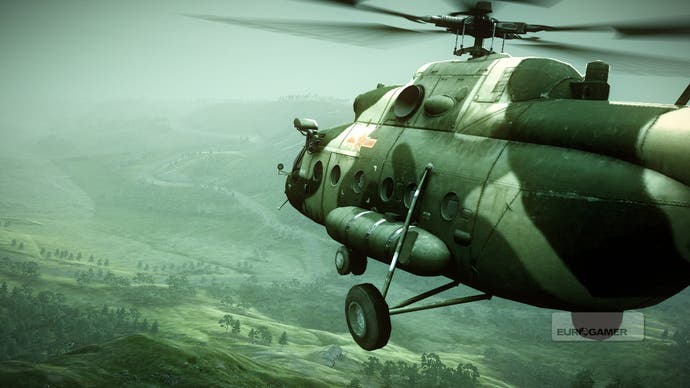Operation Flashpoint: Dragon Rising
Beyond the call.
Infinity Ward is a liar. An excellent liar with a clutch of fantastic, irresistible lies, but a liar nevertheless. Its Modern Warfare games claim to show players the future of professional conflict, a virtual replication of the horrors and thrills that will soon buffet soldiers to their particular nation's greater good. And we swallow the story. Who knows if, like many of Hollywood's action movie producers, Call of Duty is part-funded by the US military? It would certainly be money well spent. As an army recruitment tool the series is unrivalled: how many young men have been drawn to real battlefields, inspired to enlist by their glories on those virtual ones?
But Modern Warfare's relentless firework display of mortars and corridored, Michael Bay-esque set-pieces are, in truth, little more than a theme-park approximation of combat. The slick drama, that flows largely absent of reality's upsets, is more military-themed rollercoaster than sober training tool. As a result, in some far-flung theatre of war, a gamer soldier today lies facedown in the sod, his friends dying all around, no mission checkpoint markers to guide his advances or soft-save his progress, cursing the day he swallowed the lie. Codemasters sidles up alongside him, drops to one knee and presses Operation Flashpoint: Dragon Rising into his wounded hands, whispering: "If it was truth you were after, soldier, you should have played this."
Mission 7: Bleeding Edge. My four-man squad is huddled close to the battle's edge, but not quite close enough. It's a long walk to the first objective: an enemy AT team blocking a road that must be cleared out before our vehicles can advance. If there's one thing you're going to be doing a lot of in Operation Flashpoint, it's walking. The game's much-touted 35-mile draw distance may be an excellent back-of-the-box boast, but you'll rue the scale when you have to trek across it. As a simulation, even these fit marines tire soon enough when running at full pelt, the frantic pulse of their hearts soon vibrating loud through the controller. Moreover, take a stray bullet to the leg and you won't be running anywhere in a hurry.
As such, I order the team to a nearby armoured vehicle: two in the back, one on the mounted gun; I drive. The road is clear ahead, the desaturated, next-gen screed of greens and browns uninterrupted by the wobble of enemy movement. Foot down, I move to call up the overhead map to take point but, before the input registers, there's a thwap and the screen falls black. In Operation Flashpoint, like war, there are no archangels to soundtrack the transition from this world to the next. Death is instant, usually unexpected and never vainglorious. I didn't even get to see my mind splatter on the windshield, or the cold smirk of the twitching sniper who, two kilometres away, took the shot.

When it comes to military simulations, console gamers have been poorly served in recent years. The Ghost Recon series' transition from Xbox to Xbox 360 shifted the game from military sim to military rollercoaster, thus doing away with one of Xbox Live's most popular serious multiplayer war-games. It's this long vacant niche that Dragon Rising steps into, its business primarily frowning over huge maps, plotting paths through enemy patrols before inching forward through the undergrowth, breath bated, knees a-knocking.
Through a single-player campaign of 11 missions you take control of a four-man squadron of US marines, taking on the Chinese army in an effort to free a Russian island taken over by the PLA. Each mission is divided into a handful of objectives, which you are free to make your way towards in pretty much any fashion you see fit: direct, as the crow flies through enemy machine-gun emplacements, or via sweeping detours around the island. The emphasis on realism means that, despite the contemporary weaponry, you're not guaranteed a headshot just because you lined one up perfectly. For players mollycoddled by recent FPS military titles this will be a rude awakening. Want to switch from an assault rifle to a bazooka? Then you'll have to sit through a painstaking 10-second animation in which you lay the weapon on the ground before uncasing a rocket and gingerly loading it. Every manoeuvre has to be carefully plotted, closing distance before attacking, making use of terrain and the islands copious foliage cover, thinking like a soldier rather than an action game hero.








